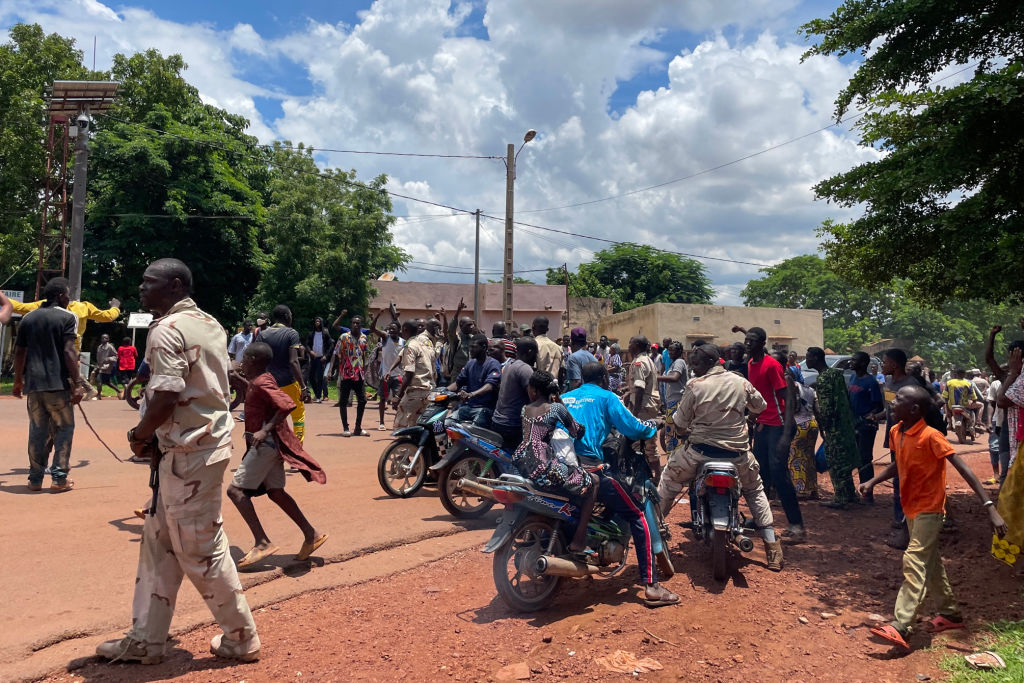ADF STAFF
In the pale light of dawn on July 22, two vehicles rigged with explosives set off on a deadly attack on Mali’s biggest military base in Kati, just 15 kilometers northwest of the capital of Bamako.
Islamist militants entered the camp, burned parked vehicles and stole two Army vehicles. Heavy gunfire was heard for an hour before helicopters circled above the base.
Col. Assimi Goïta, the leader of Mali’s military junta who regularly stays at his house on the base, reportedly was whisked away in a convoy heading to Bamako.
Never before in the decadelong insurgency by al-Qaida and Islamic State-linked militants had a rebel strike hit so close to Mali’s seat of power.
Experts such as senior researcher Héni Nsaibia of The Armed Conflict Location & Event Data Project note that the insurgency is growing despite the junta’s promises to destroy it.
Recent attacks show “how the al-Qaida affiliate Jama’at Nusrat al-Islam wal-Muslimin (JNIM) continues to expand its operations outside its traditional strongholds in northern and central Mali,” he told The Associated Press.
“As in other Sahelian countries such as Burkina Faso and Niger … major cities including the capitals themselves are increasingly surrounded by a steady spread of Islamist militancy that poses an ever-increasing risk and challenge to the security environment.”
The most brazen of at least 15 attacks in June and July, the scene in Kati further illustrated that the junta’s counterterrorism efforts have failed to turn back the extremist threat.
In a statement issued later on the day of the Kati attack, the military sought “to reassure the population that the situation is under control and that it can go about its usual business.”
But normalcy and business as usual have departed Bamako.
Mali’s military tightened security in the capital and closed major roads “to counter this terrorist threat in both Kati and Bamako.”
“Some roads leading to the military camp or to the residence of the transitional president are also cut off,” Army spokesperson Col. Souleymane Dembele told the AP. “Every day we arrest terrorists in Bamako or nearby.”
In June, a JNIM leader threatened that the capital would be attacked soon. Since then, citizens have felt the burden of increasing insecurity and threats.
Rebels recently issued an ominous warning to the people of Kati, targeting those who cooperate with the military. The audio message caused panic when it circulated on WhatsApp.
“When you see a kamikaze car [suicide bomb vehicle] coming from far away, taking care to avoid bars, concert venues, soccer stadiums, markets to target only a military camp, you should understand that [the military] is our target,” the message said.
“But if you show us that you and the army are the same thing, then why do we bother targeting only the military camp?”
The latest developments are a clear setback for the ruling junta’s disjointed approach to counterterrorism, according to Rida Lyammouri, senior fellow at the Morocco-based Policy Center for the New South.
“If these groups can infiltrate and attack Mali’s most protected base at Kati, then they can do the same against strategic locations in Bamako,” he told AP.
Insecurity has risen since Goïta, who appointed himself transitional president after the second of two military coups since 2020, ordered French troops and a European Union force to leave the country.
The junta also constrained the operations of the United Nations peacekeeping force, MINUSMA.
In their place, Mali invited the shadowy Russian Wagner Group’s mercenaries to help fight the rebels. Instead of making progress, however, the military and Russian mercenaries have been accused of massacring civilians.
In claiming the Kati attack, JNIM said it was in response to Wagner Group atrocities.
“We say to the Bamako government: if you have the right to hire mercenaries to kill the defenseless innocent people, then we have the right to destroy you and target you,” the statement read.
Lyammouri says the increased frequency and intensity of attacks have further undermined Goïta’s counterterrorism strategy.
“The withdrawal of the French forces has certainly left a vacuum, especially at the intelligence level,” he said. “This puts Bamako and other areas of the country in a more vulnerable position against jihadist groups. Through previous experience, preventing infiltration and attacks is very difficult.”


Comments are closed.